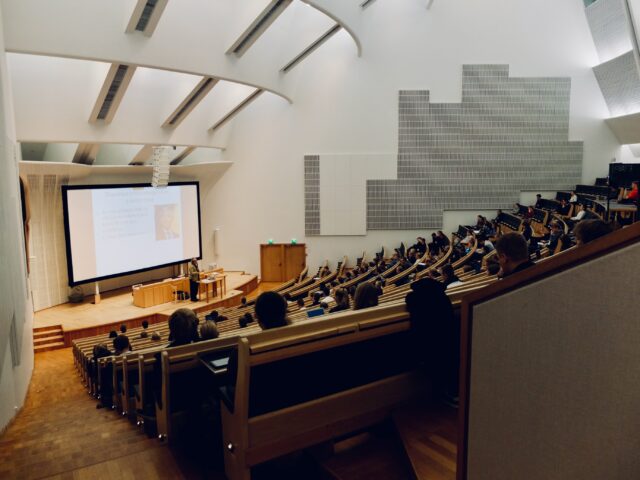The University of Calgary has received a $50M gift from the Arthur JE Child Foundation to support a new cancer centre. The funds will support a new facility that will accelerate research innovations and provide cancer care and treatment. UCalgary states that the The Arthur JE Child Comprehensive Cancer Centre will be the largest comprehensive cancer centre in Canada. The centre is anticipated to open in 2024 and will include 160 inpatient beds and advanced diagnostics tools. “This transformational gift to OWN.CANCER will accelerate our learning health model for the cancer centre — one in which researchers work side by side with care teams to dramatically improve outcomes for patients and families,” said UCalgary President Ed McCauley.

Top Ten News
July 11, 2023
The Government of British Columbia recently announced a $5M investment into supporting incoming professionals in the skilled trades. The investment will help to remove barriers to trades and apprenticeships for women, Indigenous peoples, and other under-represented groups. “This funding is about making sure that B.C. is training and supporting the next generation of apprentices and journey people,” said BC Minister of State for Workforce Development Andrew Mercier.
In a recent editorial for University World News Patrick Blessinger and Madasu Bhaskara Rao discuss the role of postsecondary institutions in fostering sustainable, symbiotic learning ecosystems. Blessinger and Bhaskara argue that the global knowledge society is becoming increasingly interconnected and is transforming into a global learning society where formal, non-formal, and informal learning will likely become increasingly interconnected. The authors write that postsecondary institutions– which already promote formal learning–should integrate non-formal and informal learning into the educational experience to provide students with a more integrated experience.
A recently-released feasibility report examining Yukon University’s proposed multi-sport varsity program indicates that such a program is viable with a minimum financial commitment and perpetual annual investments. The report recommends that either a three- or five-sport varsity program be introduced, with the most plausible identified sports including cross-country skiing, basketball, volleyball, Arctic sports, and archery. The report also recognized potential barriers to success, including a potential negative public response, a perception of competition with the local sports community, and funding realities.
At its final meeting of the academic year, the University of Toronto’s Academic Board approved a number of projects, including the launch of new programs, the renovation and expansion of Innis College, and the launch of a new department. Two of the new programs–a music industry program and a technology specialist program–will be offered by UTSC in partnership with Centennial College. The renovation project will see Innis receive a new addition; renovations to critical areas such as classrooms, the commuter lounge, and the rooftop terrace; and changes to Innis Library to improve accessibility. Innis Principal Charlie Keil said that the redesign aims to ensure that “every space serves students.” The board also approved a proposal to establish an African studies centre as an extra-departmental unit at the Faculty of Arts & Science.
In a recent editorial for Inside Higher Ed, Johanna Alonso discusses two studies on academic alerts that investigated the impact of emailing feedback to students and texting students about assignments and deadlines. The studies found that these communications helped students do better early in the semester, but as the course progressed, student performance fell in line with that of classmates who did not receive these “nudges.” Researcher Chanit’a Holmes (Virginia Tech) explained that future studies could explore how the frequency and content of alerts changes this outcome, as well as ways to address challenges such as student disappointment in not seeing an improvement in their grades.
Four institutions in Canada have recently celebrated the positive results of accreditation programs. Lakeland College’s Interior Design Technology program has been recognized by the Decorating and Interior Design Association of Alberta (DIDAA). Students in the program will have access to more collaborative and networking opportunities in the design industry and will be eligible to participate in design competitions. HEC Montréal and McGill University’s Desautels Faculty of Management both celebrated re-accreditations for their business programming, by AACSB and EQUIS respectively. Memorial University’s Conference and Event Services unit is now registered with Rainbow Registered, a national accreditation program offered by Canada’s 2SLGBTQI+ Chamber of Commerce.
Niagara College broke ground this week on a state-of-the-art greenhouse. The greenhouse will feature a horticulture laboratory, a vertical grow room, and five contained bays for applied research projects. The space will offer students new learning experiences and will serve as a hub for Niagara’s Horticultural & Environmental Sciences Innovation Centre. The $9.4M infrastructure project is supported by partners such as Niagara Region Economic Development and Federal Economic Development Agency for Southern Ontario.
The University of Saskatchewan’s satellite project was officially launched into outer space late last week. The RADSAT-SK CubeSat, a miniaturized satellite, will be used for experiments related to space radiation. “It’s kind of unreal,” said Dustin Preece, a student who worked on the project as the technical manager. “Just to see the thermal tape on there, glimmer in the sun every once in a while. That was really cool.” The satellite was developed as part of the Canadian CubeSat Project.
Université Laval’s Faculty of Forestry, Geography and Geomatics will receive up to $600K from the Government of Quebec to support the Partnership Research Chair on Permafrost in Nunavik. The funds will be used to maintain and develop permafrost knowledge in the context of climate change, support and accelerate adaptation to climate change in QC’s permafrost regions, and ensure the Research Chair is sustained over time. The funding follows a $900K investment provided by QC in 2021 to establish the chair.
